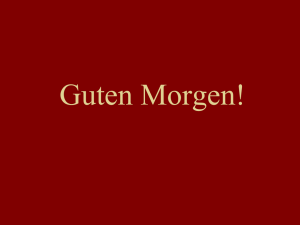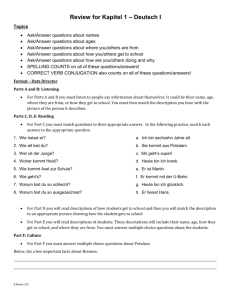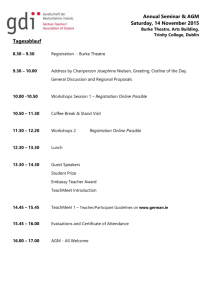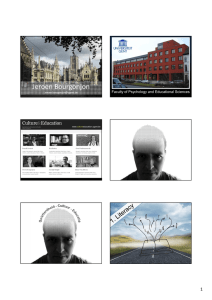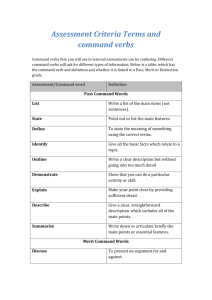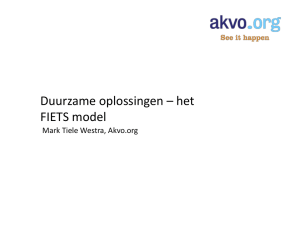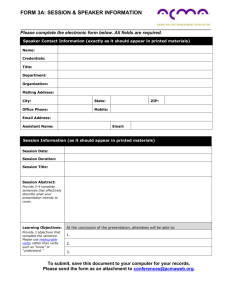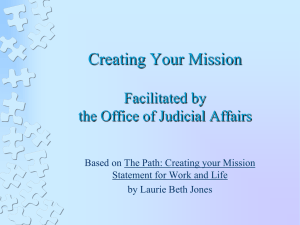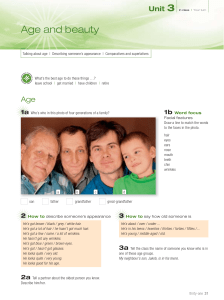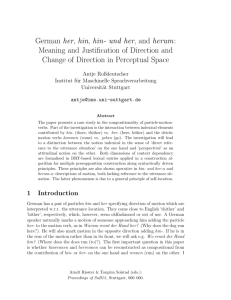German for beginners
advertisement
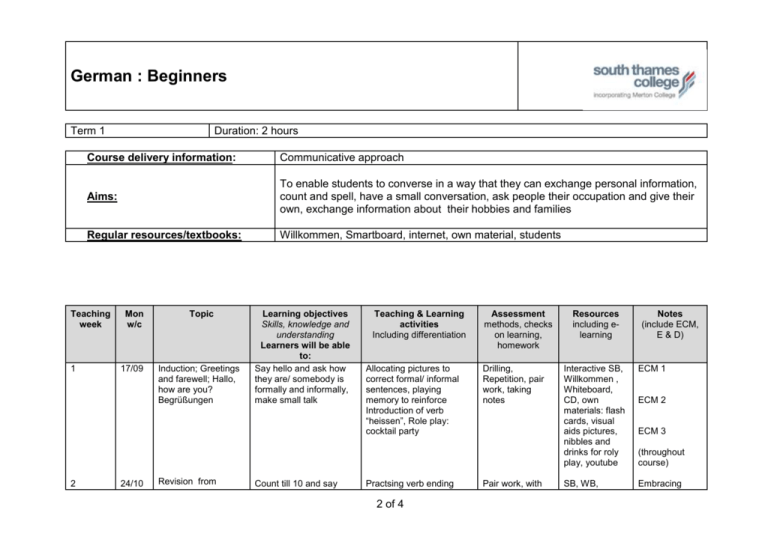
German : Beginners Term 1 Course delivery information: Communicative approach Aims: To enable students to converse in a way that they can exchange personal information, count and spell, have a small conversation, ask people their occupation and give their own, exchange information about their hobbies and families Regular resources/textbooks: Willkommen, Smartboard, internet, own material, students Teaching week 1 2 Duration: 2 hours Mon w/c Topic 17/09 Induction; Greetings and farewell; Hallo, how are you? Begrüßungen 24/10 Revision from Learning objectives Skills, knowledge and understanding Learners will be able to: Say hello and ask how they are/ somebody is formally and informally, make small talk Count till 10 and say Teaching & Learning activities Including differentiation Allocating pictures to correct formal/ informal sentences, playing memory to reinforce Introduction of verb “heissen”, Role play: cocktail party Practsing verb ending 2 of 4 Assessment methods, checks on learning, homework Drilling, Repetition, pair work, taking notes Pair work, with Resources including elearning Notes (include ECM, E & D) Interactive SB, Willkommen , Whiteboard, CD, own materials: flash cards, visual aids pictures, nibbles and drinks for roly play, youtube ECM 1 SB, WB, Embracing ECM 2 ECM 3 (throughout course) 3 01/10 lesson 1 Wie heist du/ Wie heissen Sie? Zahlen, 0-10, Alphabet Introducing: Wie is Ihre/deine Telfonnummer German alphabet and equipping to pronounce letters correctly Ask each other their telephonenumbers… “heissen”, repeating , spelling number 0-10, listening to and repeating German Alphabet , roleplay visiting cards, taking notes, Repetions drill (numbers/ alphabet), role play youtube, visual aids, Alphabet “with Einstein” Revision lesson 2: Wie ist Ihre/deine Telfonnummer, Alphabet and numbers Woher kommen Sie? / Wo wohnen Sie?, Intro: Countries and their names in German, i.e. nationalities Say where they come from, they live and ask the same informally and formally Say what nationality they are Saying where you come from & where you live ( identifiying verb endings: kommen / wohnen) (regular) – gap filling, listening and note taking application role play, spelling Eliciting question words from L 2 and Drilling, repetition, learning countries in game form, pair work SB presentation gap fill and instructions, Youtube, own material: visuals for different country, Willkommen (listening) 4 07/10 Continue: Woher kommen Sie?/ Wo wohnen Sie?, country names, 3rd person singular Say how they are and ask someone else formally and informally. Say where someone comes from and ask formally and informally Writing task,application in pairs, identifying countries (visuals) Wie geht es Ihnen? Sie kommt aus x. Wo liegt..?, talking about themselves and others (3rd prs. Singular) Speaking in pairs, Listening, speaking exercises, gap fill exercises (verbs), pair work Repetition, drilling, Map of Europe, plus other maps from ss’s contires Whiteboard, CD, own material: visual aids, Willk. 5 14/10 Fragewoerter, practising introductions, end of Lesson 1 quiz assessment Intro: Wie geht es dir? + different answers Talk about how they are by applying new expressions, apply some names of countries and cities in German in the context of where someone comes from Offering answers (question words, creating mind map), team work – deciding together on correct answer in quiz. Repeating answers to “Wie geht’s?” Eliciting, working in different pairs. Quiz covering material to date, role play with vising cards (checking/ correcting) SB, handouts visiting cards, Willkommen, own materials: visual aids 2 of 4 different nationalities enrolled on the course throughout class presentation, implemented in reading texts and listening examples (throughout course) 6 21/10 Continue: previous lessons: Wie geht es Ihnen/ wie geht’s + expressions Woher kommen Sie + some cities and countries Apply prepositions “ich komme aus…ich wohne in… more confidently adding some new vocab, apply German names of countries and capitals and recognise numbers 11-100 Practising different answers to how they are, gap filling, word search, pair work (application), negative sentence, practising verbs + endings, note taking Repetition, drill, pair work, listening and gap fill exercise, note taking and feedback, SB/ gap fill and instructions, hand out word search Willkommen, CD, own material 7 04/11 Continue “Woher kommen diese Leute/ Wo wohnen sie”, verbs and endings Länder und Hauptstädte, introduction number 11-100 Practising prepositions and phrases, regognising and applying countries and their capitals/ finding out about others, writing "richtig oder falsch”Saetze for peers and discuss Filling gaps (preps and verb endings), conjugating verbs, making up sentences, pair work, watching a film including note taking, practising sentences applying countries and capital cities Gap fill/ elicing, feedback, asking questions on content of film/ students’ answers, pair work, checking SB, Willkommen, own material, for gap fill and competitive game (four in a row covering all lessons so far) 8 12/11 Adding information to personal profile Revision numbers 11-100 in context of personal profile To speak about themselves in greater detail (retired?married?) and ask questions about others, apply higher numbers when talking about their telephone and house numbers etc. Filling gaps to demonstrate understanding on existing vocab/ prepositions. Building vocab: putting expressions with same meaning next to each other, sorting exercise/ group work, listening, writing own profile and sharing with the class, decision making on (in)correct sentences with extension Eliciting (gap fill) Listening (check understanding of new vocab), Pair work: put new phrases next to each other (check and correct), group work: arranging phrases in the correct order listening, feedback SB, youtube, Cultural input – handouts, maps pictures 9 19/11 Introducing Was bist du von Beruf? Was studierst du?/ nationalities and genders in more detail To write a postcard with various pieces of info they’ve learnt Know the name of some jobs and studies Post card writing and rearranging to correct meaningful order, running dictation to check comprehension and pronunctiation pictures, pair work, quiz Interviewing each other (pair work), food sampling, knots and Interactive SB throughout, handouts (phrases) and envelopes (sentences in 2 of 4 crosses, sentence auction game strips), WB, CD, Willkommen 10 26/11 Hobbys und Freizeit Freundschaften und Familienbeziehungen Number 101+ Talk about jobs and studies Confidently apply verbs wohnen, kommen, arbeiten, sprechen sein und haben Leisure pursuits, various plural of nouns, applying info to their own families Offering answers (question words, creating mind map), team work – deciding together on correct answer in quiz. Flash cards/ visuals Interactive SB, CD, own materials, 11 03/12 Revision and develop further Hobbys und Freizeit Freundschaften und Familienbeziehungen Talk further and in more detail about jobs and studies Use apply verbs wohnen, kommen, arbeiten, sprechen sein und haben Leisure pursuits, various plural of nouns, applying info to their own families Offering answers (question words, creating mind map), team work – deciding together on correct answer in quiz. Flash cards/ visuals Interactive SB, CD, own materials 12 10/12 Revision lesson 110/ games and quizzes, end of year celebration + cultural input Say what they are doing--leisure activity and conjugate regular verbs Say what they like/dislike doing Name their family Talking German over food and drink, apply what they have learnt during the term, in teams decide on correct answers together during quizzes and games Team work answers and feedback in quizzes and games Food and drink, SB and hand outs, quizzes, games own material, students contributions photographs, , music, cultural input 2 of 4
